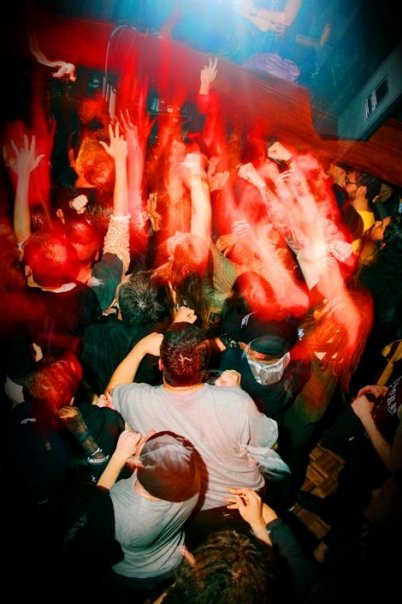I'm doing a piece on Liz Buckingham for NPR! Pretty stoked - she's a killer interview, and a huge inspiration. It'll be posted pretty soon, I guess. I got carried away on the intro and delved a little too deeply into 'Wizard history, so that's headed for the chopping block. I really liked what I originally came up with, though, so I'm throwing it up on here for posterity.
Rough Draft - Intro for VENUS AND FUZZ PEDALS: An Interview with LIZ BUCKINGHAM (ELECTRIC WIZARD)
UK doom titans Electric Wizard are a shadowy entity at best; a monolithic, esoteric mystery otherwise. Borne of the ashes of proro-Wizardian projects Eternal, Grief Eternal, and Lord of Putrefaction (musical ideas, like fine wine or bratty teenagers, need time to mature and lose their ungainly limbs and excess baby fat) the behemoth first began its flight in 1993 in the small, quiet English hamlet of Dorset. Small towns keep their secrets close, but for those who follow such things, it’s long been known that Dorset is possessed of a certain eldritch quality, buoyed by age-old reports of fairies, ghosts, will ‘o wisps, howling winds and rotting churches. Those ancient stones and lonesome moors breed ill omens and witchcraft, and fittingly enough, it is here that Electric Wizard’s occult doom rituals began in earnest. 1995 saw the release of their self-titled opus, and during the ensuing years, Jus Osborn and his marauding band of Brits released a series of splits, EPs, and 1997’s Come My Fanatics LP. Their following grew from cult to countrywide and finally to global phenomenon, securing them a sepulchre within doom’s most hallowed hallways and spreading the three-horned gospel of black magic, bad luck, and druglust far and wide.
2000, though, was the year the levy broke - Electric Wizard released their now-classic Dopethrone LP, and the world of riff-based stoner jams, heavy psychedelic vibes, and that which we call doom metal would never be the same. Epic in scope, effortless in execution, and catchy as the black death, the album's eight expansive compositions reign in the band's earlier psychedelic freakouts and erupt into a beautifully violent crescendo of sheer amplifier-worship. Inspired by B-movies’ gleeful gore and pneumatic Venus ’and the sultry, sinister auras of seventies’ film noir, narrated by Osborn’s entombed wail, the album conjured up images of Satanic bordellos and bloodstained altars. Moreover, there were songs - honest to goodness songs, with bastardized melodies that stuck in your head, seeped into your consciousness, and left you no other recourse than to wreck your neck for the . Many of the band’s signature tunes - “Funeralopolis,” “Vinum Sabbathi,” “We Hate You,” and the endlessly satisfying endlessness of the title track - are found therein, and the blueprints it drew in blood have served as the starting point for more bands than even seems feasible. The funereal fuzz of Dopethrone will forever be known as the ‘Wiz’s career highlight, genre defining landmark, seminal release, and above all, the kind of record that heavy metal (and heavy riffs’) Godfather Tony Iommi, would be proud of.
Electric Wizard had truly arrived, but within the ranks of the cursed few, trouble was brewing. A quick follow-up came in Let Us Prey, accompanied by a host of personal problems within the band - legal, medical, some may say musical. An ill-fated North American tour and several lineup changes later, the dynamic had shifted once again. “Manning” the axe, as it were, was an American guitarist named Liz Buckingham, who brought order to chaos alongside her black tar licks, world-rattling riffs, and road dogged experience in sludge fiends 13 and Sourvein. Her first album with Electric Wizard, 2004’s We Live, featured a leaner, meaner sound, streamlined yet still mind-melting and mercilessly heavy. Her presence was felt immediately, and nowadays, it’s impossible to think of the ‘Wizard without her molten leads, flying fingers, and flaxen-haired, dark-eyed visage floating above the stage. Liz rarely does interviews, and this one was a long time coming - we first contacted her this past spring, and, after months of crossed fingers and transcontinental email chains, her responses materialized out of the aether.
Liz is an extreme metal icon, an immensely talented musician, and, despite her low-key demeanor, an incredible inspiration to other women who feel the urge to strap on a guitar and hew some sonic slabs of their own. As a bastion of understated, self-confident strength, self-confidence, and femininity within a traditionally male-dominated genre, she has risen to the absolute summit, and shows no sign whatsoever of stepping down off her (dope)throne. Here’s what she had to say about her fluid evolution from classical scion to the reigning high priestess of doom.
Stay tuned for the finished piece!
Tuesday, October 11, 2011
Thursday, October 6, 2011
...
It's frustrating when a penchant for talking about the music you enjoy leads others to brand you as "insecure," or "trying too hard."
I am many things, but "insecure" is definitely not one of them. Why is it when a woman writes about how much she loves (insert random black metal band here) she's automatically met with derision, but when a man does the same thing, it's all "yeah man" and no big deal?
I love Wormphlegm, Loretta Lynn, Amebix, Nirvana, Thou, Tormentor, and Bestial Warlust. Come at me, bro.
I am many things, but "insecure" is definitely not one of them. Why is it when a woman writes about how much she loves (insert random black metal band here) she's automatically met with derision, but when a man does the same thing, it's all "yeah man" and no big deal?
I love Wormphlegm, Loretta Lynn, Amebix, Nirvana, Thou, Tormentor, and Bestial Warlust. Come at me, bro.
Subscribe to:
Posts (Atom)


